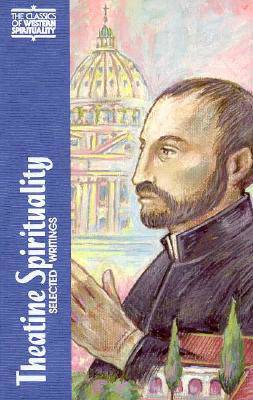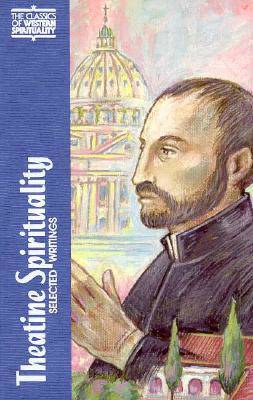
- Retrait gratuit dans votre magasin Club
- 7.000.000 titres dans notre catalogue
- Payer en toute sécurité
- Toujours un magasin près de chez vous
- Retrait gratuit dans votre magasin Club
- 7.000.000 titres dans notre catalogue
- Payer en toute sécurité
- Toujours un magasin près de chez vous
Theatine Spirituality
Selected Writings
27,95 €
+ 55 points
Description
"The Classics series, which has inspired many less-successful imitations over the years, has fulfilled its promise and given us an invaluable resource of the soul." The Catholic Historical Review Theatine Spirituality: Selected Writings translated, edited and with an introduction and notes by William V. Hudon preface by Gigliola Fragnito "I remind you that even all the saints are unable to make you as beloved by Christ as you yourself are able. Will to be so, and if you wish Christ to love you and help you, then love Him, direct your will toward pleasing Him always, and never doubt that even if you are abandoned by all the saints and by all creatures, He will always help you in your need." Gaetano da Thiene to Elisabetta Porto, 10 July 1522 The Theatine order of clerics regular was founded in 1524 by four members of the roman branch of the famous Oratory of Divine Love: St. Gaetano da Thiene, Gian Pietro Carafa, Bonifacio de' Colli and Paolo Consiglieri. The history of the order possesses great significance for the larger Tridentine reformation in Italy. Theatine charitable work, especially among the sick and poor, developed out of the context of the Oratory and was propelled by the same renewed zeal that animated the religious and social service activities of old and new orders and congregations after the Council of Trent. Numerous Theatines held influential positions in the ecclesiastical hierarchy, the most famous (and infamous) of which was Carafa, who served as the hated and intransigent Pope Paul IV between 1555 and 1559. Early Theatines wrote spiritual literature that arguably represents the most significant accomplishment of the order. Gaetano composed letters seeking as well as giving advice on the spiritual life that reveal not only his own devotional interests, but also those of his fellow Theatines, in addition to those of his mostly female correspondents. His letters appear here for the first time in English. Lorenzo Scupoli wrote one of the classics of post-Tridentine spiritual literature, Il combattimento spirituale (The Spiritual Combat). The text has been published in numerous editions and many languages since it originally appeared in 1589. In reality, it has been over-translated: reshaped and adapted for audiences far larger than the convent of nuns for which Scupoli intended it. His most important works appear here in a translation that seeks to return them to their proper context and to render them and their author more comprehensible. This volume also includes Carafa's primitive Rule for the Theatine order in a new translation. translated, edited and with an introduction and notes by William V. Hudon preface by Gigliola Fragnito "I remind you that even all the saints are unable to make you as beloved by Christ as you yourself are able. Will to be so, and if you wish Christ to love you and help you, then love Him, direct your will toward pleasing Him always, and never doubt that even if you are abandoned by all the saints and by all creatures, He will always help you in your need." Gaetano da Thiene to Elisabetta Porto, 10 July 1522 The Theatine order of clerics regular was founded in 1524 by four members of the roman branch of the famous Oratory of Divine Love: St. Gaetano da Thiene, Gian Pietro Carafa, Bonifacio de' Colli and Paolo Consiglieri. The history of the order possesses great significance for the larger Tridentine reformation in Italy. Theatine charitable work, especially among the sick and poor, developed out of the context of the Oratory and was propelled by the same renewed zeal that animated the religious and social service activities of old and new orders and congregations after the Council of Trent. Numerous Theatines held influential positions in the ecclesiastical hierarchy, the most famous (and infamous) of which was Carafa, who served as the hated and intransigent Pope Paul IV between 1555 and 1559. Early Theatines wrote spiritual literature that arguably represents the most significant accomplishment of the order. Gaetano composed letters seeking as well as giving advice on the spiritual life that reveal not only his own devotional interests, but also those of his fellow Theatines, in addition to those of his mostly female correspondents. His letters appear here for the first time in English. Lorenzo Scupoli wrote one of the classics of post-Tridentine spiritual literature, Il combattimento spirituale (The Spiritual Combat). The text has been published in numerous editions and many languages since it originally appeared in 1589. In reality, it has been over-translated: reshaped and adapted for audiences far larger than the convent of nuns for which Scupoli intended it. His most important works appear here in a translation that seeks to return them to their proper context and to render them and their author more comprehensible. This volume also includes Carafa's primitive Rule for the Theatine order in a new translation. +
Spécifications
Parties prenantes
- Editeur:
Contenu
- Nombre de pages :
- 320
- Langue:
- Anglais
- Collection :
Caractéristiques
- EAN:
- 9780809104796
- Date de parution :
- 01-01-96
- Format:
- Livre relié
- Format numérique:
- Genaaid
- Dimensions :
- 160 mm x 237 mm
- Poids :
- 589 g






